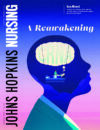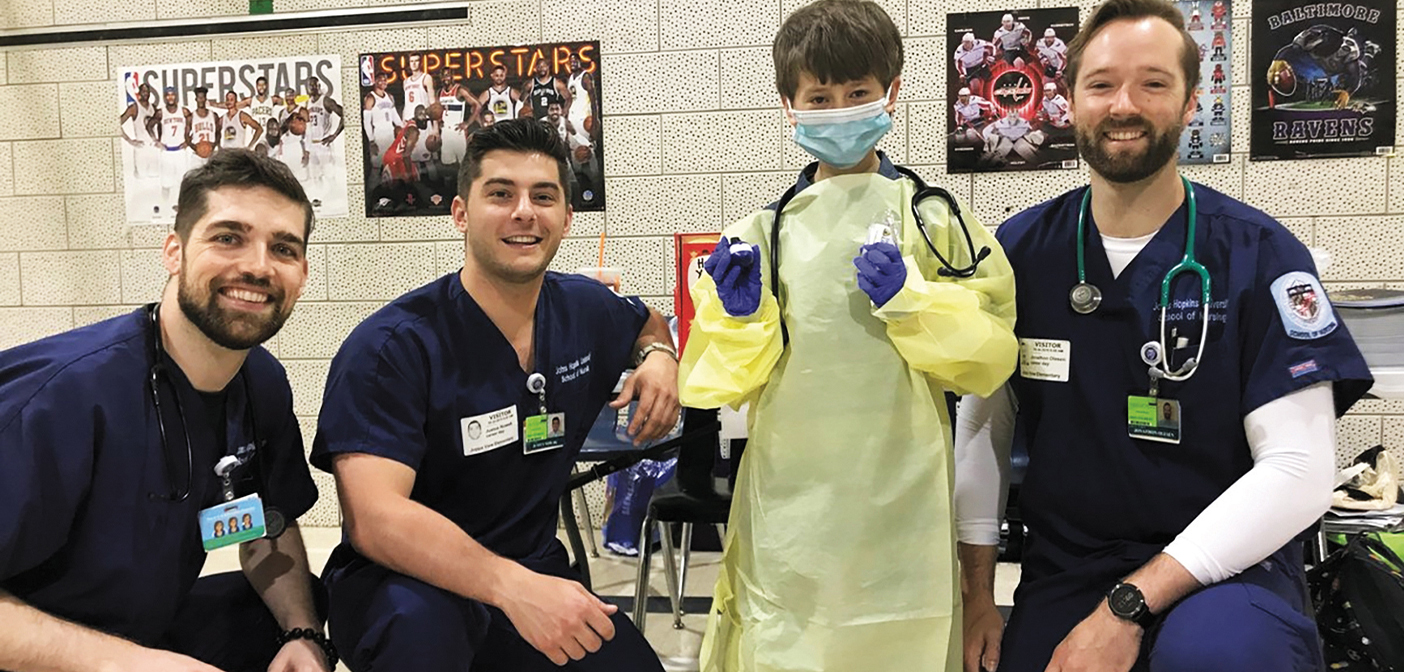Story By Steve St. Angelo
Nursing has long had room for men, and the numbers (plus a school award as male-friendly) suggest that the guys are catching on
The award wasn’t as much a surprise as an affirmation: The Johns Hopkins School of Nursing (JHSON) has been named among the 2019 Best Schools for Men in Nursing by the American Association for Men in Nursing. The award cited the school’s history, consistency, quality, and commitment to creating an inclusive environment for men who are becoming professional nurses.
It’s a salute to an ongoing JHSON effort to build a robust, prepared, and richly diverse workforce of nurses to deal with the challenges and opportunities of nursing care as well as to more fully represent the patients they serve, no matter the demographic identifiers.
For many years, severe nursing shortages have hovered just over the horizon. In the United States as elsewhere, populations were living longer, experiencing more chronic ailments as a tradeoff. Rural areas that struggled to attract physicians increasingly looked toward nurses to fill the gap. The Affordable Care Act offered many Americans essential treatment and prevention they had long been unable to access.
Still, it took a while for men to know their place—in nursing.
Herb Zinder, the first male admitted to JHSON (with Jim Leyva in 1968), helped set the mold, turning a love for hands-on health care and anesthesia into a nursing career that culminated with building Zinder Anesthesia Associates and then guiding his son, Matthew, into the family business. On Graduation Day 1999, Matthew and his dad became JHSON’s first father/son alumni. Mother-son JHSON graduates have likewise become far less rare.
The questions raised then are still heard on occasion: “Why aren’t you a doctor instead? Isn’t that a woman’s work?” But as nurses of all gender designations earn doctoral degrees and MBAs, as they design and implement change at the boardroom level, attack inequities as political representatives, and, yes, save lives at the bedside, these questions are becoming more faint and … quaint.
“A big part of [choosing JHSON] was being in the Peace Corps and working with the doctors there. They encouraged me to go back to school for medicine and I said, ‘No, I’m going to go back to school for nursing,’” says Jason Boyd, who graduated in August from the MSN (Entry into Nursing Program).
Today, the world’s most trusted profession is roughly 11 percent male, a figure that continues to grow. A male nurse, Kevin Sowers, is president of the Johns Hopkins Health System and executive vice president of Johns Hopkins Medicine. Male and female JHSON students work shoulder to shoulder, pushing each other as colleagues and collaborators. The experience has turned male graduates into ambassadors.
“There’s a really big place for everyone in nursing,” says Boyd.
“Nursing needs people of all genders, races, all backgrounds. Not just to get more men into the program but to get more of everyone into the program.”
“Nursing needs people of all genders, races, all backgrounds. Not just to get more men into the program but to get more of everyone into the program. … Something that I really like about nursing is it allows me to get in, get my hands on the patient, talk to them, to really sit down, be with them, and get a little bit more into their life and where they come from. I feel that medicine does that, but not to the extent that I get to do it as a nurse,” he explains. “Anybody who has even to the tiniest ‘want’ to be a nurse should come in and try it out.”
The American Association for Men in Nursing honor should help there.
“This is a proud moment to be recognized for our efforts as we strive to provide a diverse environment to educate future nursing leaders of all genders,” says Dean Patricia Davidson, PhD, MEd, RN, FAAN. “As the profession broadens its scope and innovation, it is vital to also expand the diversity and inclusion of its workforce to meet health care needs around the globe.”

